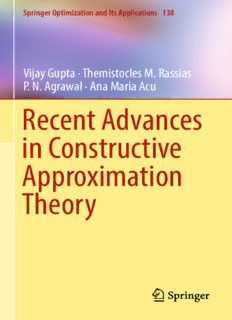Table Of ContentSpringer Optimization and Its Applications 138
Vijay Gupta · Themistocles M. Rassias
P. N. Agrawal · Ana Maria Acu
Recent Advances
in Constructive
Approximation
Theory
Springer Optimization and Its Applications
Volume 138
ManagingEditor
PanosM.Pardalos,UniversityofFlorida
Editor-CombinatorialOptimization
Ding-ZhuDu,UniversityofTexasatDallas
AdvisoryBoard
J.Birge,UniversityofChicago
S.Butenko,TexasA&MUniversity
F.Giannessi,UniversityofPisa
S.Rebennack,KarlsruheInstituteofTechnology
T.Terlaky,LehighUniversity
Y.Ye,StanfordUniversity
AimsandScope
Optimizationhasbeenexpandinginalldirectionsatanastonishingrateduringthe
lastfewdecades.Newalgorithmicandtheoreticaltechniqueshavebeendeveloped,
thediffusionintootherdisciplineshasproceededatarapidpace,andourknowledge
ofallaspectsofthefieldhasgrownevenmoreprofound.Atthesametime,oneof
themoststrikingtrendsinoptimizationistheconstantlyincreasingemphasisonthe
interdisciplinarynatureofthefield.Optimizationhasbeenabasictoolinallareasof
appliedmathematics,engineering,medicine,economicsandothersciences.
The series Springer Optimization and Its Applications publishes undergraduate
and graduate textbooks, monographs and state-of-the-art expository works that
focusonalgorithmsforsolvingoptimizationproblemsandalsostudyapplications
involvingsuchproblems.Someofthetopicscoveredincludenonlinearoptimization
(convex and nonconvex), network flow problems, stochastic optimization, optimal
control, discrete optimization, multi-objective programming, description of soft-
warepackages,approximationtechniquesandheuristicapproaches.
Moreinformationaboutthisseriesathttp://www.springer.com/series/7393
Vijay Gupta • Themistocles M. Rassias
P. N. Agrawal • Ana Maria Acu
Recent Advances in
Constructive Approximation
Theory
123
VijayGupta ThemistoclesM.Rassias
DepartmentofMathematics DepartmentofMathematics
NetajiSubhasInstituteofTechnology NationalTechnicalUniversityofAthens
NewDelhi,India Athens,Greece
P.N.Agrawal AnaMariaAcu
DepartmentofMathematics DepartmentofMathematicsandInformatics
IndianInstituteofTechnology LucianBlagaUniversityofSibiu
Roorkee,India Sibiu,Romania
ISSN1931-6828 ISSN1931-6836 (electronic)
SpringerOptimizationandItsApplications
ISBN978-3-319-92164-8 ISBN978-3-319-92165-5 (eBook)
https://doi.org/10.1007/978-3-319-92165-5
LibraryofCongressControlNumber:2018944286
MathematicsSubjectClassification:47-XX,30-XX,32-XX,34-XX,41-XX,46-XX,49-XX,65-XX
©SpringerInternationalPublishingAG,partofSpringerNature2018
Thisworkissubjecttocopyright.AllrightsarereservedbythePublisher,whetherthewholeorpartof
thematerialisconcerned,specificallytherightsoftranslation,reprinting,reuseofillustrations,recitation,
broadcasting,reproductiononmicrofilmsorinanyotherphysicalway,andtransmissionorinformation
storageandretrieval,electronicadaptation,computersoftware,orbysimilarordissimilarmethodology
nowknownorhereafterdeveloped.
Theuseofgeneraldescriptivenames,registerednames,trademarks,servicemarks,etc.inthispublication
doesnotimply,evenintheabsenceofaspecificstatement,thatsuchnamesareexemptfromtherelevant
protectivelawsandregulationsandthereforefreeforgeneraluse.
Thepublisher,theauthorsandtheeditorsaresafetoassumethattheadviceandinformationinthisbook
arebelievedtobetrueandaccurateatthedateofpublication.Neitherthepublishernortheauthorsor
theeditorsgiveawarranty,expressorimplied,withrespecttothematerialcontainedhereinorforany
errorsoromissionsthatmayhavebeenmade.Thepublisherremainsneutralwithregardtojurisdictional
claimsinpublishedmapsandinstitutionalaffiliations.
Printedonacid-freepaper
ThisSpringerimprintispublishedbytheregisteredcompanySpringerInternationalPublishingAGpart
ofSpringerNature.
Theregisteredcompanyaddressis:Gewerbestrasse11,6330Cham,Switzerland
Preface
Recent Advances in Constructive Approximation Theory deals with various recent
problems on linear positive operators. We survey upon recent research work in
this domain and also present extensions of known approximation results on linear
positive operators in post quantum and in bivariate setting. This book is designed
forgraduatestudents,researchers,andengineersworkingonapproximationtheory
and related areas of mathematical analysis. The book in hand is a self-contained
research monograph which presents theory, methods, and various applications in
mathematicalanalysisandapproximationtheory.
WewouldliketoacknowledgethesuperbassistancethatthestaffofSpringerhas
providedforthepublicationofthisbook.
NewDelhi,India VijayGupta
Athens,Greece ThemistoclesM.Rassias
Roorkee,India P.N.Agrawal
Sibiu,Romania AnaMariaAcu
v
Contents
1 MomentGeneratingFunctionsandCentralMoments .................. 1
1.1 SomeOperators ......................................................... 1
1.1.1 BernsteinOperators............................................. 1
1.1.2 BaskakovOperators ............................................ 3
1.1.3 Szász–MirakyanOperators..................................... 5
1.1.4 Lupas¸Operators ................................................ 7
1.1.5 PostWidderOperators.......................................... 8
1.2 KantorovichTypeOperators............................................ 10
1.2.1 Bernstein–KantorovichOperators ............................. 10
1.2.2 Baskakov–KantorovichOperators............................. 13
1.2.3 Szász–KantorovichOperators.................................. 15
1.2.4 Lupas¸–KantorovichOperators ................................. 17
1.3 DurrmeyerTypeOperators ............................................. 19
1.3.1 Szász–DurrmeyerOperators ................................... 20
1.3.2 Baskakov–SzászOperators..................................... 21
1.3.3 Pa˘ltaˇneaTypeOperators........................................ 24
2 QuantitativeEstimates ...................................................... 29
2.1 DiscreteOperators ...................................................... 30
2.1.1 ModifiedSzász–MirakyanOperators.......................... 30
2.1.2 Lupas¸-TypeModifiedOperators ............................... 33
2.1.3 ModifiedBaskakovTypeOperators ........................... 37
2.2 SomeIntegralOperators................................................ 43
2.2.1 Post-WidderOperators ......................................... 43
2.2.2 Lupas¸–KantorovichTypeModifiedOperators ................ 44
2.2.3 ModifiedSzász–KantorovichOperators....................... 49
2.2.4 ModifiedSzász–DurrmeyerOperators......................... 51
2.2.5 ModificationsofPhillipsOperators............................ 53
2.3 BetterApproximationbyCertainPositiveLinearOperators ......... 56
2.3.1 BernsteinTypeOperators ...................................... 56
2.3.2 Bernstein–DurrmeyerTypeOperators......................... 59
vii
viii Contents
2.3.3 BézierVariantoftheBernstein–Durrmeyer
TypeOperators.................................................. 61
2.3.4 Bernstein–StancuTypeOperators ............................. 63
2.3.5 Lupas¸OperatorsBasedonPólyaDistribution ................ 67
3 BasicsofPost-quantumCalculus........................................... 73
3.1 Introduction ............................................................. 73
3.2 SomeNotationsofq-Calculus ......................................... 74
3.3 CertainDefinitionsof(p,q)-Calculus................................. 76
3.3.1 (p,q)-BetaFunctionofFirstKind ............................ 79
3.3.2 (p,q)-BetaFunctionofSecondKind ......................... 83
3.3.3 (p,q)-ExponentialandGammaFunction..................... 84
3.4 SomeDiscrete(p,q)Operators........................................ 85
4 (p,q)-IntegralOperators................................................... 91
4.1 KantorovichTypeOperators............................................ 91
4.1.1 (p,q)-Bernstein–KantorovichOperators...................... 91
4.1.2 (p,q)-Baskakov–KantorovichOperators ..................... 93
4.1.3 (p,q)-Szász–Mirakyan–KantorovichOperators.............. 101
4.2 DurrmeyerTypeOperators ............................................. 103
4.2.1 (p,q)-Bernstein–DurrmeyerOperators ....................... 103
4.2.2 Limit(p,q)-Bernstein–DurrmeyerOperators................. 111
4.2.3 (p,q)-Baskakov–DurrmeyerOperators....................... 121
4.2.4 (p,q)-Szász–DurrmeyerOperators............................ 124
4.2.5 (p,q)-VariantofSzász-BetaOperators ....................... 127
5 UnivariateGrüss-andOstrowski-TypeInequalitiesforPositive
LinearOperators............................................................. 135
5.1 Grüss-TypeInequalitiesforaPositiveLinearFunctional............. 135
5.2 Grüss-TypeInequalitiesforSomePositiveLinearOperators......... 137
5.2.1 TheClassicalHermite–FejérInterpolationOperator ......... 141
5.2.2 TheConvolution-TypeOperator ............................... 142
5.2.3 KingOperators.................................................. 144
5.2.4 APiecewiseLinearInterpolationOperatorS ............... 146
(cid:2)n
5.3 EstimatesviaCauchy’sMeanValueTheorem......................... 147
5.4 Grüss-TypeInequalitiesonCompactMetricSpaces.................. 148
5.5 GrüssInequalitiesviaDiscreteOscillations........................... 151
5.5.1 ApplicationsforLinearOperators ............................. 152
5.5.2 Grüss-Type Inequalities via Discrete Oscillations
forMoreThanTwoFunctions ................................. 156
5.6 OstrowskiInequalities .................................................. 157
6 BivariateGrüss-TypeInequalitiesforPositiveLinearOperators...... 163
6.1 BivariateLinearOperators.............................................. 163
6.1.1 BivariateBernsteinOperator................................... 163
6.1.2 BivariateSzász–MirakyanOperators.......................... 164
6.1.3 BivariateBaskakovOperators.................................. 164
Contents ix
6.1.4 BivariateKingOperators....................................... 164
6.1.5 BivariateHermite–FejérInterpolationOperators ............. 165
6.1.6 BivariateConvolutionOperators............................... 166
6.1.7 BivariatePiecewiseLinearInterpolationOperators
atEquidistantKnots ............................................ 167
6.1.8 BivariateLagrangeOperator................................... 169
6.2 Grüss-TypeInequalitiesintheBivariateCase......................... 169
6.3 TheCompositeBivariateBernsteinOperators ........................ 171
6.4 ACubatureFormulaAssociatedwiththeBivariateBernstein
Operators ................................................................ 176
6.5 Grüss-TypeInequalitiesviaDiscreteOscillations..................... 178
7 EstimatesfortheDifferencesofPositiveLinearOperators............. 183
7.1 DifferencesofPositiveLinearOperatorsUsingtheTaylor
Expansion ............................................................... 183
7.2 InequalitiesforPositiveLinearFunctionalsandApplications........ 186
ρ
7.3 TheClassofOperatorsU ............................................. 191
n
7.4 DiscreteOperatorsAssociatedwithCertainIntegralOperators...... 194
8 BivariateOperatorsofDiscreteandIntegralType ...................... 199
8.1 BivariateOperatorsofBernsteinType................................. 199
8.1.1 BivariateCaseofq-Bernstein–Schurer–Stancu............... 204
8.2 BivariateOperatorsofKantorovichType.............................. 217
8.2.1 BivariateCaseofq-Bernstein–Schurer–Kantorovich......... 217
8.3 BivariateOperatorsofDurrmeyerType................................ 220
8.3.1 TheBivariateGeneralizationofq-Stancu–Durrmeyer
TypeOperators.................................................. 220
8.3.2 BivariateofLupas¸–DurrmeyerTypeOperators............... 225
8.3.3 q-DurrmeyerOperators......................................... 228
8.3.4 Bivariateq-Bernstein–Chlodowsky–DurrmeyerOperators... 230
8.4 BivariateChlodowsky–Szász–Kantorovich–CharlierType
Operators ................................................................ 233
8.5 Bivariate q-Dunkl Analogue of the
Szász–Mirakjan–KantorovichOperator................................ 238
9 ConvergenceofGBSOperators............................................ 241
9.1 GeneralDefinitionsofGBSOperators................................. 241
9.2 GBSOperatorsofDiscreteType ...................................... 243
9.2.1 q-Bernstein–Schurer–StancuType............................ 243
9.2.2 BivariateChlodowsky–Szász–CharlierTypeOperators ...... 249
9.2.3 BivariateChlodowsky–Szász–AppellTypeOperators........ 250
9.2.4 NumericalExamples............................................ 255
9.2.5 BernsteinTypeinThreeVariables............................. 256
9.3 GBSOperatorsofContinuousType ................................... 261
9.3.1 q-Durrmeyer–PólyaType ...................................... 261
9.3.2 q-Bernstein–Schurer–KantorovichType ...................... 264
x Contents
9.3.3 q-Stancu–DurrmeyerType..................................... 269
9.3.4 Bernstein–Schurer–Stancu–KantorovichTypeBased
onq-Integers.................................................... 270
9.3.5 Durrmeyer–Lupas¸Type ........................................ 273
9.3.6 GBSOperatorsofq-DurrmeyerType ......................... 274
9.4 GBSOperatorofChlodowsky–Szász–Kantorovich–Charlier
Operators ................................................................ 276
9.4.1 q-Dunkl Analogue of the
Szász–Mirakjan–KantorovichType............................ 277
Bibliography...................................................................... 279
Index............................................................................... 289
Chapter 1
Moment Generating Functions
and Central Moments
1.1 SomeOperators
Thissectiondealswiththemomentgeneratingfunctions(m.g.f.)andmomentsupto
sixthorderofsomediscretelydefinedoperators.Wementionthem.g.f.andexpress
them in expanded form to obtain moments, which are important in the theory of
approximationrelevanttoproblemsofconvergence.1
1.1.1 BernsteinOperators
Forf ∈C[0,1]then-thdegreeBernsteinpolynomialsaredefinedas
(cid:3) (cid:4) (cid:3) (cid:4)
(cid:2)n
n k
B (f,x) := xk(1−x)n−kf . (1.1.1)
n
k n
k=0
By simple computation, the moment generating function of the Bernstein
polynomialisgivenby
1The interested reader is referred to the works [162–166] relevant to other techniques for the
approximationofmomentsoftrigonometricfunctionswithapplicationstoproblemsofanalytic
numbertheory,suchasRiemann’sHypothesis.
©SpringerInternationalPublishingAG,partofSpringerNature2018 1
V.Guptaetal.,RecentAdvancesinConstructiveApproximationTheory,
SpringerOptimizationandItsApplications138,
https://doi.org/10.1007/978-3-319-92165-5_1
Description:This book presents an in-depth study on advances in constructive approximation theory with recent problems on linear positive operators. State-of-the-art research in constructive approximation is treated with extensions to approximation results on linear positive operators in a post quantum and biva

